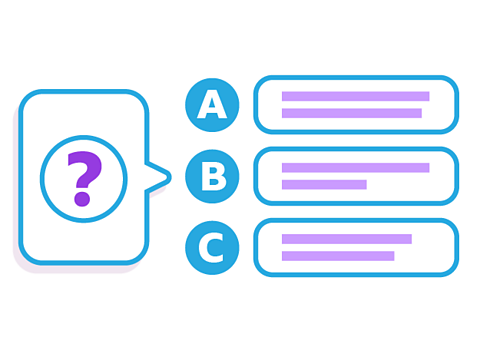Key points about negative forms in French

Sentences can be made negative in French using ne … pas, in different tenses.
There are other words to make sentences negative too, such as ne … jamais (never), ne … rien (nothing) and ne … personne (nobody/no one).
In negative questions either add a question mark to a statement and change your voice to a questioning tone, or insert est-ce que into the question.
Higher Tier only – Words in French such as ne … que (only), ne … ni … ni (neither … nor), ne … plus (no longer) and ne … pas encore (not yet) also make sentences negative.
Higher Tier only – Negative structures usually go around any pronoun that comes before the verb, such as me (me), te (you) and y (there), as well as the conjugateList the different forms of a verb, according to the person and the tense. verbA word used to describe an action or state of being..
Video: The negative form
Watch the video to learn how to use negative forms in French.
For Foundation Tier the shown forms ne … pas, ne … jamais, ne … rien and ne … personne should be learned.
For Higher Tier, the shown forms ne … plus, ne … ni … ni and ne … que should also be learned.
The negative form or never, not, nothing, nobody, only, no more words.
In French, if you want to make a sentence negative, form a 'sandwich' around the main verb.
'Ne', or n' in front of a vowel or silent h, means 'not' and comes before the verb, and a negative term is placed after it.
Il n'aime pas les ordinateurs.
He doesn't like computers.
Here are the other negative terms that are useful to remember.
She can't see anything.
Elle ne voit rien.
I never accept dangerous missions.
Je n'accepte jamais de missions dangereuses.
I don't recognise anyone.
Je ne reconnais personne.
I don't know what to do anymore.
Je ne sais plus quoi faire.
And note the negative sentence structure for something like:
They take neither the car nor the boat.
Ils ne prennent ni la voiture, ni le bateau.
Alors, il ne reste que le tandem !
So it only leaves them with the tandem!
How to form negatives in French
Forming negatives is an important part of speaking and writing French.
To say ‘not’, use Sorry, something went wrongCheck your connection, refresh the page and try again. and Sorry, something went wrongCheck your connection, refresh the page and try again. on either side of the conjugated verb. Use n’ before a vowel or h.
- In the present tense they are placed around the main verb in the sentence:
For example:
Je ne veux pas aller à la plage. – I don’t want to go to the beach.
Il ne joue pas au foot. – He isn’t playing football./He doesn’t play football.
- In the perfect tense, the negative words wrap around the auxiliary verbs avoir or être:
For example:
Ils n’ont pas fait leurs devoirs. – They didn’t do their homework.
Nous ne sommes pas allés aux États-Unis. – We didn’t go to the USA.
- In the near future tense, the negative words are placed around aller:
For example:
Nous n’allons pas manger au restaurant cet après-midi. – We aren’t going to eat at the restaurant this afternoon.
Other negative structures
These other negative structures are also formed by wrapping the negative words around the conjugated verb:
| Negative form | English | Example |
|---|---|---|
| Sorry, something went wrongCheck your connection, refresh the page and try again. | nothing | Elle ne boit rien. – She doesn’t drink anything. |
| Sorry, something went wrongCheck your connection, refresh the page and try again. | never | Nous n’allons jamais fumer. – We’re never going to smoke. |
| Sorry, something went wrongCheck your connection, refresh the page and try again. | nobody/no one/not anyone | Je ne connais personne ici. – I don’t know anyone here. |

Remember
Be careful not to confuse une personne (a person/someone) with ne … personne (no one).
For example:
Il y a une personne à la banque. – There is a person/someone at the bank.
Il n’y a personne à la banque. – There isn’t anyone at the bank.
Making questions negative
With negative questions, either add a question mark and make the pitch of your voice go up to make a questioning tone when speaking, or insert Sorry, something went wrongCheck your connection, refresh the page and try again. into the question.
For example:
Tu ne vas pas au concert ce soir ? – Aren’t you going to the concert this evening?
Pourquoi est-ce que vous n’aimez pas faire la natation ? – Why don’t you like going swimming?
Making a sentence negative with a verb followed by an infinitive
Where a verb is followed by an infinitive, the negative words wrap around the first verb, the one that is conjugated, and the infinitive follows it.
For example:
Je ne voudrais pas manger les frites. – I wouldn’t like to eat the chips.
Nous n’aimons pas aller en ville. – We don’t like going to town.
Elle ne va rien dire. – She is going to say nothing.
Making sentences negative - Mini quiz

What is the French translation of this phrase?
I don’t see the cat.
Je ne vois pas le chat.
What is the French translation of this phrase?
He doesn’t see anything.
Il ne voit rien.
Quiz - Negative forms in French
Practise what you've learned about negative forms in French with this quiz.
Higher Tier – How to use other negative forms
These other negative forms are also constructed by wrapping the negative words around the conjugated verb:
| Negative form | English | Example |
|---|---|---|
| Sorry, something went wrongCheck your connection, refresh the page and try again. | no longer, not anymore | Mon grand-père ne travaille plus. – My grandfather doesn’t work anymore. |
| Sorry, something went wrongCheck your connection, refresh the page and try again. | only | Ils n’ont qu’un petit peu d’argent. – They only have a little bit of money. |
| Sorry, something went wrongCheck your connection, refresh the page and try again. | neither … nor | Tu ne manges ni viande ni poisson ? – Do you eat neither meat nor fish? |
| Sorry, something went wrongCheck your connection, refresh the page and try again. | not yet | Je ne suis pas encore prêt. – I’m not ready yet. |
Starting a sentence with a negative word
Personne … ne and rien … ne can also be used as the subject of the sentence.
For example:
Personne n’est allé au concert hier. – No one went to the concert yesterday.
Rien n’est possible en ce moment. – Nothing is possible at the moment.
Using negatives with pronouns
Negative structures usually go around not only the conjugated verb but also any pronoun such as me (me), te (you), y (there) and en (it/of it), that comes before the verb.
For example:
Je n’y habite plus. – I don’t live there anymore.
Il ne m’a pas vu. – He didn’t see me.
Nous n’en avons pas besoin. – We don’t need it.
Using negative forms - Mini quiz

What is the French translation of this phrase?
I like neither football nor cricket.
Je n’aime ni foot ni cricket.
What is the French translation of this phrase?
No one is coming.
Personne ne vient.
Higher Tier - Quiz - Negative forms in French
Practise what you've learned about negative forms in French with this Higher Tier quiz.
Now you’ve learned about negative forms in French, why not explore impersonal verbs and expressions?